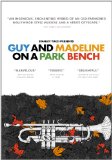| Reviews & Columns |
|
Reviews DVD TV on DVD Blu-ray 4K UHD International DVDs In Theaters Reviews by Studio Video Games Features Collector Series DVDs Easter Egg Database Interviews DVD Talk Radio Feature Articles Columns Anime Talk DVD Savant Horror DVDs The M.O.D. Squad Art House HD Talk Silent DVD
|
DVD Talk Forum |
|
|
| Resources |
|
DVD Price Search Customer Service #'s RCE Info Links |
|
Columns
|
|
|
Guy and Madeline on a Park Bench
THE MOVIE:
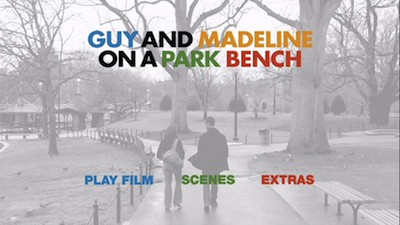
The spirit of John Cassavetes is alive and well and shooting on the streets of Boston.
Writer/director Damien Chazelle's Guy and Madeline on a Park Bench is a 2010 indie relationship film shot in a classic verite style that hearkens back to the great work Cassavetes was doing in the 1960s, as well as the influential films of the Cahiers du cinema crowd. Guy and Madeline has also earned comparisons to Jacques Demy's The Umbrellas of Cherbourg. It has a romantic heart that beats to a jazzy rhythm, one that is purposefully out of step with the manic drums of modern music. It's an anachronistic conceit that Chazelle wears right out in the open. I get the sense he'd be pleased by all the comparisons and references to possible influences. It's all intentional, all by design. Why else choose to shoot on 16mm black-and-white film if not to remind us of cinema long past?
The story of Guy and Madeline is simplicity itself. Guy (Jason Palmer) is a jazz trumpet player who ruins his young relationship with Madeline (Desiree Garcia) when he cheats on her with Elena (Sandha Khin). This quick hook-up is an ill-considered impulse, Guy only just met Elena on the subway, and eventually, he will come to regret the decision when the new girl gets clingy. While he's figuring this all out, Madeline has decided to move on, and she begins exploring the possibility of getting out of Boston and going to New York.
The principle players of Chazelle's film are all dreamers in some fashion. Guy is a music maker. Like many musicians before him, he's more obsessed with the complications of melody than he is the complications of l'amour. To him, people are played in much the same way he plays his horn. It's not for nothin' that his seduction of Elena is achieved merely by touch. Chazelle avoids making Elena an empty device, giving her an interior life, as well. She is a lonely girl all by herself in the city. Just before meeting Guy, she hits on a street performer; just after, she encounters an old man wandering the streets looking for a connection. (He is played by a fellow named Frank Garvin. Save the "male prostitute" jokes for Fred.) It's hard to tell if none of these connections work out for her due to naïveté or selfishness, though it's also hard not to feel sorry for her either way. Sandha Khin has a broken quality that, if natural, signals very good casting, but if it's intentional, it signals a very good actress. (One wonders, given that she first introduces herself by her own name, only to correct herself and give her character's name, a flub Chazelle decided to leave in.)
Madeline proves to be the real dreamer, however. Guy and Madeline on a Park Bench is full of music, jazzy numbers composed by Justin Hurwitz and recorded by local jazz musicians and the Bratislava Symphony Orchestra. Most of it is either background scoring or live performances by Guy and his friends, including one tap dance routine that spontaneously erupts at a party. It's live music within the scene, and so grounded in the "real life" of the movie; Madeline's songs are more in line with the old-school, theatrical musical tradition. She sings her tunes as expressions to the self, and the instrumentation backing her up is essentially the music she hears in her head. For her second number, she also imagines her co-workers dancing along, turning her mundane waitressing job into a choreographed performance. As the wronged party in her relationship with Guy, she is the true romantic, and so also the one who fantasizes about a life free of everyday confinement. He may be the artist, but she's the one with an artist's soul.
Guy and Madeline on a Park Bench is shot in a down-and-dirty style. Scenes are loose in the moment, and there is an air of improvisation to the whole affair. The actors appear to be either unprofessional or first-timers who aren't overly polished, and yet who are comfortable onscreen. Chazelle served as his own cameraman (and he also co-edited with W.A.W. Parker), and he favors intimate close-ups and cramped quarters where characters can't escape one another. (A shower scene involving Guy and Elena is particularly uncomfortable.) Street scenes appear to have been captured as they happened, with plenty of real life occurring in the backgrounds. As the music takes over, the camera backs away and the image widens. The editors also put their scissors down, letting the takes run long the way they would have in Golden Age Hollywood, when you could actually watch the performers do their thing without lots of frenetic trickery.
The final sum of all these parts is a fascinating, playful merging of styles. It's MGM by way of the Nouvelle Vague, and though at times the story feels underdeveloped, the emotion is authentic and the characters real enough to make them worth watching. And, of course, there is Hurwitz's excellent music, cut in at all the right times to make sure our attention never drifts. Guy and Madeline on a Park Bench builds to a satisfying, yet open-ended conclusion, where consequences for previous choices come to bear and there is enough honest growth that it leaves us hopeful that they will make better ones down the line.
This charming mash-up also makes you wonder what will be down the line for the people who squished it all together. Damien Chazelle has certainly set a unique bar for himself. Guy and Madeline on a Park Bench combines the personal with spectacle in such a way that makes you want to see more, but the fear is Chazelle could go too far to either side and lose what made this first effort so interesting in the first place. It'll be a balancing act, one I'll be watching while holding my breath and crossing my fingers, hoping against hope that the filmmaker makes it all the way across.
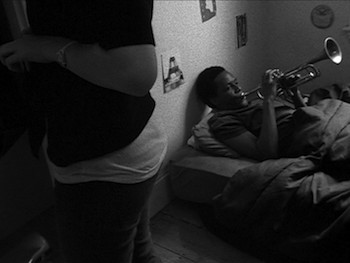
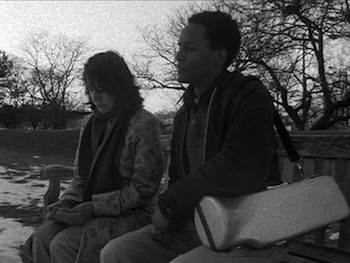
THE DVD
Video:
Guy and Madeline on a Park Bench is brought to DVD at its intended full-screen, 1.33:1 aspect ratio. The black-and-white image is strong, with good contrast between light and dark. I didn't notice any digital noise or other glitches--and I assume the white spots on the black credits screens were intentional. While I am neither a purist or luddite, this is the kind of movie that reminds you what it's like for a film to be shot on film, and why black-and-white really is awesome. The values you see in the image are just wonderful.
Sound:
The 2.0 stereo mix works fine. There isn't a lot by way of subtle sound effects, which could have been nice given the film's on-the-street style, but it works fine and the dialogue all comes through clear and natural. The music also sounds good, which is definitely important.
No subtitle options are offered.
Extras:
Guy and Madeline on a Park Bench is released in a regular DVD case with an interior four-sided insert, featuring liner notes by Amy Taubin.
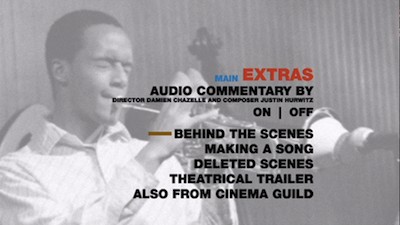
Guy and Madeline on a Park Bench is the kind of movie that is practically tailor-made for an audio commentary, and so the track with Chazelle and Hurwitz is, unsurprisingly, excellent. The director and his composer are friendly and comfortable swapping stories and joking around, and given the catch-as-catch-can nature of the production, there is plenty for them to talk about. Every scene has something interesting about how it came together, and every performer has a background worth discussing. The shoot itself took two years, so unsurprisingly, there are a lot of deleted scenes, a near half-hour of which are presented on this DVD. Chazelle has picked 13 excisions, which vary in content and tone, and includes title cards explaining where the scenes were to have fit in the narrative and what the original thoughts behind them were. Some are just loose atmospheric moments, others change character motivations completely.
The making-of featurette is nearly 20 minutes of scattershot outtakes and on-set/rehearsal footage showing different sequences being planned. It's very nuts and bolts, no connecting interviews or anything. Next to that, over 7 minutes is devoted to a "Making a Song." This takes us through the process of the development of the song "Boy in the Park," with bits of different versions from the writing, rehearsal, and recording played as audio with explanatory titles cards, and then a little footage of the actual scene shown with unmixed audio. This really gives you a sense of how a song is written, refined, and ultimately finished.
A theatrical trailer is included, alongside other trailers from Cinema Guild.
FINAL THOUGHTS:
The independent production Guy and Madeline on a Park Bench is a film born of artistic passion. Writer/director Damien Chazelle has taken the disparate influences of 1960s cinema verite and Golden Age MGM musicals and concocted a modern take on both. Shot over two years using 16mm black-and-white film, Guy and Madeline on a Park Bench has the look and spontaneity of a Cassavetes film and the musical grace of Fred Astaire, with the messy relationship stuff that belongs to no one filmmaker and no one timeframe. The DVD comes with a bunch of cool extras, making it the complete package. Recommended.
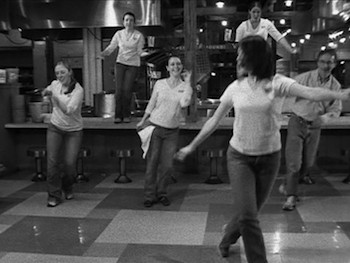
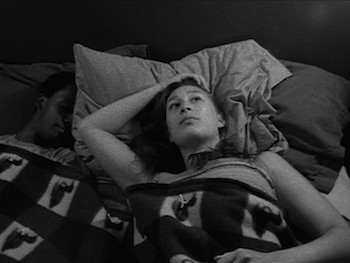
Jamie S. Rich is a novelist and comic book writer. He is best known for his collaborations with Joelle Jones, including the hardboiled crime comic book You Have Killed Me, the challenging romance 12 Reasons Why I Love Her, and the 2007 prose novel Have You Seen the Horizon Lately?, for which Jones did the cover. All three were published by Oni Press. His most recent projects include the futuristic romance A Boy and a Girl with Natalie Nourigat; Archer Coe and the Thousand Natural Shocks, a loopy crime tale drawn by Dan Christensen; and the horror miniseries Madame Frankenstein, a collaboration with Megan Levens. Follow Rich's blog at Confessions123.com.
|
| Popular Reviews |
| Sponsored Links |
|
|
| Sponsored Links |
|
|
| Release List | Reviews | Shop | Newsletter | Forum | DVD Giveaways | Blu-Ray | Advertise |
|
Copyright 2024 DVDTalk.com All Rights Reserved. Legal Info, Privacy Policy, Terms of Use,
Manage Preferences,
Your Privacy Choices | |||||||









